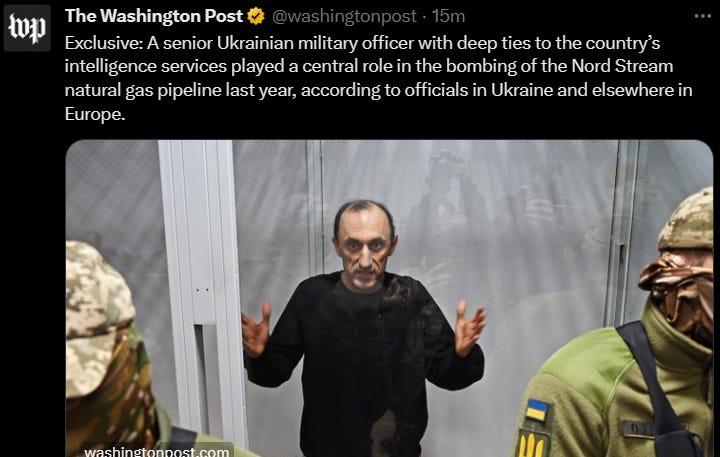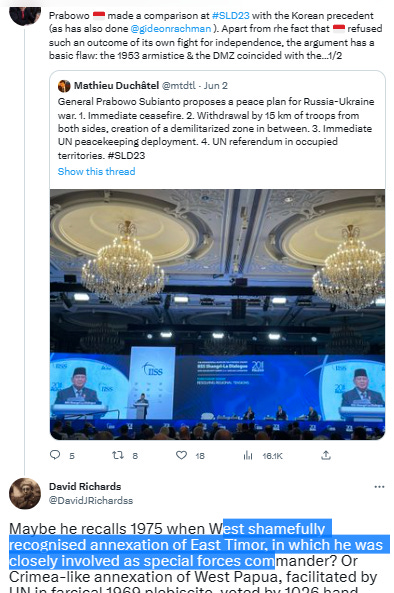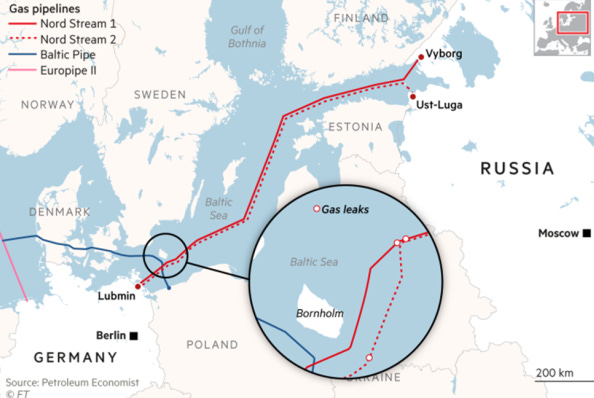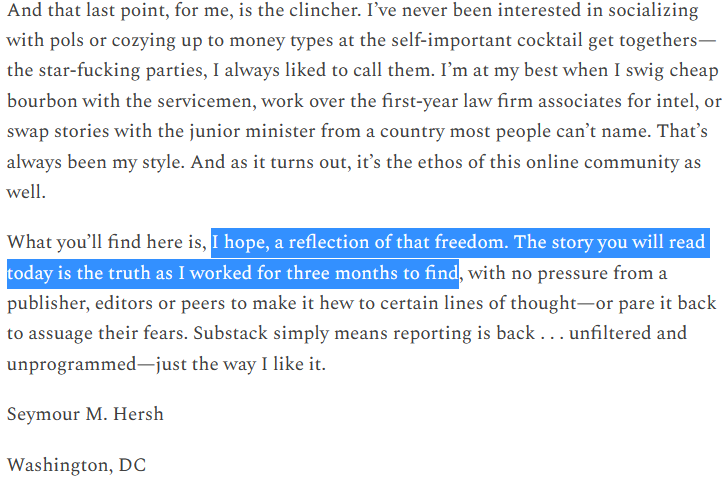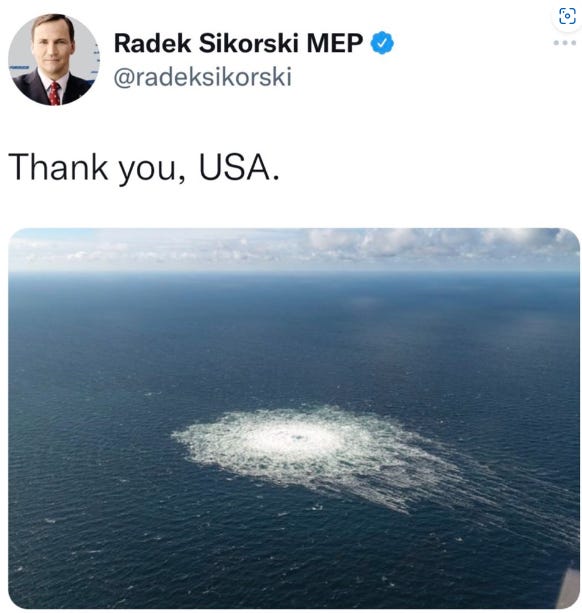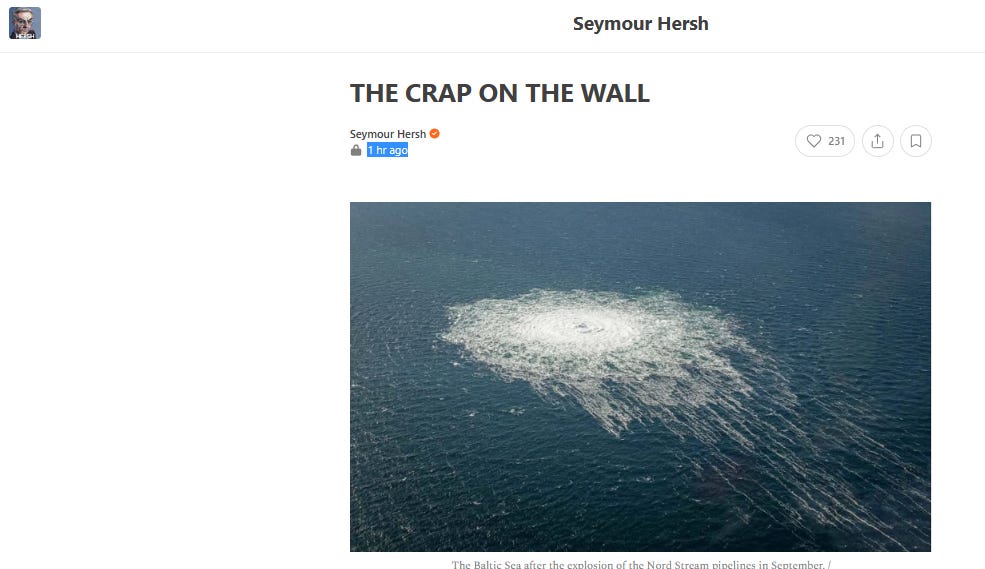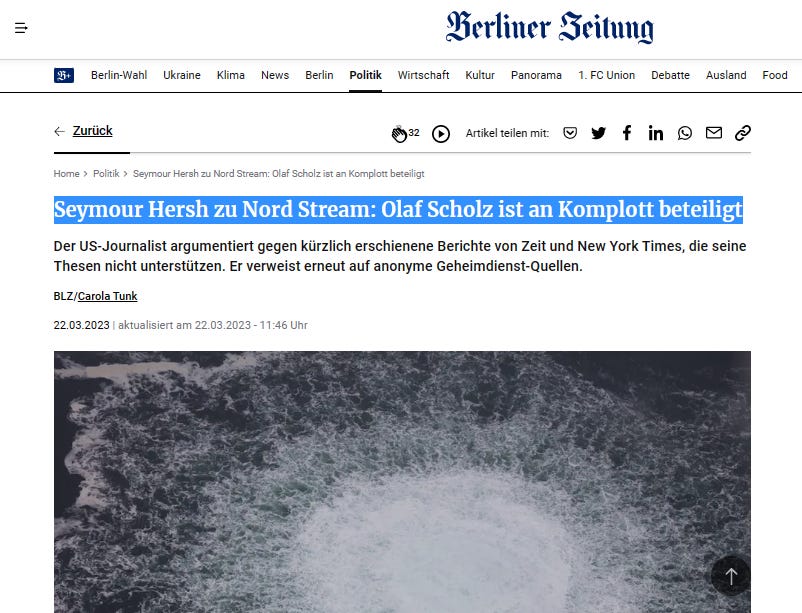Nord Stream and Nova Kakhovka Dam: 2x that Chief Kyiv Bureau Washington Post Isabelle Khurshudyan (Maybe) Feel Disrespect by Ukraine, 2x Seymour Hersh (Finally) Was Right
10.52pm Beijing / 10.52am DC / 5.52pm Kyiv / 4.52pm Brussels and Berlin
In the last 13 hours, after Nova Kakhovka Dam destroyed (around 8pm DC / 8am Beijing / 3am Kyiv / 2am Brussels and Berlin), circulated screenshot and link about Chief Bureau Kyiv and Moscow for Washington Post Isabelle Khurshudyan & co work in December 29th, 2022, about counteroffensive by Ukraine since October 2022-December 2022.
Around 10 page long (about her work, if paste-ing to google docs, standard page), and at least 2 paragraphs, saying:
Maj. Gen. Andriy Kovalchuk, the initial commander of the Ukrainian counteroffensive in the Kherson region. (Ukrainian Operative Commandment South) set out to bisect the Russian-occupied area on the west side of the Dnieper and trap the Russian forces. “My task was not only to liberate the territory,” he said. “My task from the start was to occlude and destroy the force. That is, to not let them leave or exist.”
“There were moments when we turned off their supply lines completely, and they still managed to build crossings,” Kovalchuk said. “They managed to replenish ammunition. … It was very difficult.”
Kovalchuk considered flooding the river. The Ukrainians, he said, even conducted a test strike with a HIMARS launcher on one of the floodgates at the Nova Kakhovka dam, making three holes in the metal to see if the Dnieper’s water could be raised enough to stymie Russian crossings but not flood nearby villages.
The test was a success, Kovalchuk said, but the step remained a last resort. He held off.
Her work circulated again today, 6 months after Christmas, to be proof to accuse that this (Nova Kakhovka) Dam today was destroyed by Ukraine and not Russia. Because since December (or earlier, maybe since October 2022), Ukraine army has had an intention to destroy Nova Kakhovka Dam, maybe directly instructed by Zelensky, to weaken Russia or, using Andriy Kovalchuk analogy, “to stymie Russian crossings”.
In last 48 hours, also happens a “purge”, or in soft - term, “revoke credential” by Ukrainian government to several international journos — and Isabelle know every journos who targeted-then-get revoked his or her credential, no longer again to allow to reporting in Ukraine.
(“Undercooked Intelligence”, “Unprocessed Intelligence”, situation on saga of Nova Kakhovka Dam and saga of Nord Stream. Same worrisome ““Undercooked Intelligence”, “Unprocessed Intelligence” repeatedly reminder by Daniel Ellsberg. Since it debuted last month (April 20th, 2023), Netflix's "The Diplomat" has become compulsive viewing in foreign-policy circles. It's a source of gratification among diplomats, who feel Hollywood is finally showing them the recognition it has long given C.I.A. agents. “The Diplomat” starring by Keri Lynn Russell, a wife of Matthew Rhys Evans—who portrays Daniel Ellsberg in “The Post”). Daniel Ellsberg died yesterday—June 16th, 2023, 2 days before Father’s Day
Target of official Ukrainian ire has been the New York Times (yes not Washington Post like Isabelle) reporter Thomas Gibbons-Neff (a former U.S. Marine who covers the Ukrainian military closely) and Magnum photographer, Antoine D’Agata.
Thomas, who drew particular anger when he reported that the Ukrainians were using banned cluster munitions. He has had his credentials revoked and his renewal denied in separate incidents, a Times spokesperson said, though they were ultimately re-issued. Antoine also lost his ability to report in Ukraine after a photo essay in the New York Times Magazine that documented soldiers’ psychological trauma from inside a mental health facility, according to two people familiar with the incident. D’Agata and Magnum didn’t respond to inquiries. Antoine has contributed to the world about his masterpiece to show the strength of Ukraine, especially "Duo Zelensky", Volodimir and Olenka, but now his credential is revoked. Imagine Ukraine receiving 60-70 billion by US taxpayers and even make several high-ranking GOP (especially Speaker McCarthy) angry because too much money went abroad, but Ukraine now revokes US journo to reporting. Yes, Russia jailed WSJ’s Evan Gershkovich (June 6th already Day 71 Evan in Moscow’s Lefortovo prison), but weirder if (even) Ukraine government banned journos to reporting the war.
Another dilemma again for Isabelle because she himself, alongside 5 WaPo journos (Shane Harris, Souad Mekhennet, Samuel Oakford, Michael Birnbaum and Greg Miller), and 2 times investigation by WaPo about Nord Stream (previously on April 3rd, 2023), the 2nd investigation posted less 30 minutes ago that U.S. had intelligence of detailed Ukrainian plan to attack Nord Stream pipeline. A six-person team of Ukrainian special operations forces intended to blow up the Russia-to-Germany natural gas project.
Again, in the last 19 hours just feeling that Seymour Hersh settled the score, two times. He at least investigated that Nord Stream was sabotaged by NOT RUSSIA, but (he accused) U.S. especially CIA.
A lot of people, especially journo, smeared Seymour. Even when Seymour Hersh still use a phrase “Czechoslovakia” although no longer this country exists because currently “Czech” and “Slovakia” as well. A lot of people are accusing Nord Stream of being sabotaged by Russia, and Nova Kakhovka Dam also destroyed by Russia. The dilemma, Isabelle Khursudyan herself showed, with 2 pieces of her works (Dec 29th, 2022, and today, June 6th, 2023) that both Nord Stream and Nova Kakhovka Dam were destroyed by Ukraine.
Three months before saboteurs bombed the Nord Stream natural gas pipeline, the Biden administration learned from a close ally that the Ukrainian military had planned a covert attack on the undersea network, using a small team of divers who reported directly to the commander in chief of the Ukrainian armed forces.
Details about the plan, which have not been previously reported, were collected by a European intelligence service and shared with the CIA in June 2022. They provide some of the most specific evidence to date linking the government of Ukraine to the eventual attack in the Baltic Sea, which U.S. and Western officials have called a brazen and dangerous act of sabotage on Europe’s energy infrastructure.
The European intelligence reporting was shared on the chat platform Discord, allegedly by Air National Guard member Jack Teixeira. The Washington Post obtained a copy from one of Teixeira’s online friends.
The intelligence report was based on information obtained from an individual in Ukraine. The source’s information could not immediately be corroborated, but the CIA shared the report with Germany and other European countries last June, according to multiple officials familiar with the matter, who spoke on the condition of anonymity to discuss sensitive intelligence operations and diplomatic discussions.
The highly specific details, which include numbers of operatives and methods of attack, show that for nearly a year Western allies had a basis to suspect Kyiv in the sabotage. That assessment has only strengthened in recent months as German law enforcement investigators uncovered evidence about the bombing that bears striking similarities to what the European service said Ukraine was planning.
Officials in multiple countries confirmed that the intelligence summary posted on Discord accurately stated what the European service told the CIA. The Post agreed to withhold the name of the European country as well as some aspects of the suspected plan at the request of government officials, who said exposing the information would threaten sources and operations.
Ukrainian officials, who have previously denied the country was involved in the Nord Stream attack, did not respond to requests for comment.
The White House declined to comment on a detailed set of questions about the European report and alleged Ukrainian military plot, including whether U.S. officials tried to stop the mission from proceeding.
The CIA also declined to comment.
On Sept. 26, 2022, three underwater explosions caused massive leaks on the Nord Stream 1 and 2 pipelines, leaving only one of the four gas links in the network intact. Some Biden administration officials initially suggested that Russia was to blame for what President Biden called “a deliberate act of sabotage,” promising that the United States would work with its allies “to get to the bottom of exactly what ... happened.” With winter approaching, it appeared the Kremlin might have intended to strangle the flow of energy, an act of “blackmail,” some leaders said, designed to intimidate European countries into withdrawing their financial and military support for Ukraine, and refraining from further sanctions.
February 2023, Seymour Hersh via Substack, already ten million views maybe, showed that Nord Stream sabotaged by U.S.
Since Seymour posted, a lot of people smeared his professionalism, although Seymour was Pulitzer winner. Just 4 months, at least Seymour Hersh was right: not Russia’s side who sabotage Nord Stream.
Biden administration officials now privately concede there is no evidence that conclusively points to Moscow’s involvement. But publicly they have deflected questions about who might be responsible. European officials in several countries have quietly suggested that Ukraine was behind the attack, but resisted publicly saying so over fears that blaming Kyiv could fracture the alliance against Russia. At gatherings of European and NATO policymakers, officials have settled into a rhythm as one senior European diplomat said recently, “Don’t talk about Nord Stream.”
The European intelligence made clear that the would-be attackers were not rogue operatives. All those involved reported directly to Gen. Valerii Zaluzhnyi, the country’s highest-ranking military officer, who was put in charge so that Ukraine’s president, Volodymyr Zelensky, wouldn’t know about the operation, the intelligence report said.
Keeping Zelensky out of the loop would have given the Ukrainian leader a plausible way to deny involvement in an audacious attack on civilian infrastructure that could ignite public outrage and jeopardize Western support to Ukraine — particularly in Germany, which prior to the war got half its natural gas from Russia and had long championed the project in the face of opposition from other European allies.
While Gazprom, the Russian state-owned gas conglomerate, owns 51 percent of Nord Stream, Western energy companies, including from Germany, France and the Netherlands, are partners and invested billions in the pipelines. Ukraine had long complained that Nord Stream would allow Russia to bypass Ukrainian pipes depriving Kyiv of huge transit revenue.
The intelligence summary says that the Ukrainian military operation was “put on hold,” for reasons that remain unclear. The Ukrainians had planned to attack the pipeline on the heels of a major allied naval exercise, known as BALTOPS, which ran from June 5 to 17, 2022, according to the report.
But according to German law enforcement officials investigating the September Nord Stream bombing, key details emerging of that operation line up with the earlier plot.
For instance, the Ukrainian individual that informed the European intelligence service in June said that six members of Ukraine’s special operations forces using false identities intended to rent a boat and, using a submersible vehicle, dive to the floor of the Baltic Sea then damage or destroy the pipeline and escape undetected. In addition to oxygen, the team planned to bring helium, which is recommended for especially deep dives.
German investigators now believe that six individuals using fake passports rented a sailing yacht in September, embarked from Germany and planted explosives that severed the pipelines, according to officials familiar with that investigation. They believe the operatives were skilled divers, given that the explosives were planted at a depth of about 240 feet, in the range that experts say helium would be helpful for maintaining mental focus.
Investigators have matched explosive residue found on the pipeline to traces found inside the cabin of the yacht, called Andromeda. And they have linked Ukrainian individuals to the rental of the boat via an apparent front company in Poland. Investigators also suspect that at least one individual who serves in the Ukrainian military was involved in the sabotage operation.
A collaboration of German media organizations previously reported the suspected involvement of the Ukrainian military service member.
The June plot differs from the September attack in some respects. The European intelligence report notes that the Ukrainian operatives planned to attack the Nord Stream 1 pipeline, but it makes no mention of Nord Stream 2, a newer line. The intelligence report also says that the saboteurs would embark from a different location in Europe, not Warnemünde, a German port town on the Baltic, where Andromeda was rented.
The CIA initially questioned the credibility of the information, in part because the source in Ukraine who provided the details had not yet established a track record of producing reliable information, according to officials familiar with the matter. The European service, a trusted U.S. partner, felt that the source was reliable.
But despite any reservations the CIA might have had, the agency communicated the June intelligence to counterparts in Germany and other European countries, officials said. The European service also shared it with Germany, one person said. German intelligence personnel briefed lawmakers in Berlin in late June before they left for their summer break, according to an official with knowledge of the closed-door presentation.
Officials familiar with the European report conceded that it is possible that the suspected Ukrainian plotters might have been apprised that the intelligence was shared with several countries and that they may have changed some elements of the plan.
But the report from the European intelligence service wasn’t the only piece of evidence pointing to Kyiv’s role in the pipeline bombing.
The Post previously reported that governments investigating the explosions uncovered communications that showed pro-Ukraine individuals or entities discussed the possibility of carrying out an attack on the Nord Stream pipelines. Those conversations took place before the attack, but were only discovered in its aftermath, when spy agencies scoured data for possible clues, a senior Western security official said.
Despite waiving Trump-era sanctions on the Russia-to-Germany natural gas pipeline as an attempt to mend fences with Berlin, the Biden administration had long harbored concerns about Nord Stream and did not shed tears over its September demise.
After months of pressure from Washington, the German government halted final authorization of Nord Stream 2 just days before Russian forces invaded Ukraine in February 2022, surprising many U.S. and European officials who had worried Berlin would find Russia too important an energy source to sever ties. At the time of the attack, the pipeline was intact and had already been pumped full with 300 million cubic meters of natural gas to ready it for operations.
Nearly a month before the rupture, the Russian energy giant Gazprom stopped flows on Nord Stream 1, hours after the Group of Seven industrialized nations announced a forthcoming price cap on Russian oil, a move intended to put a dent in the Kremlin’s treasury.
Officials have said that the cost of repairing the pipelines would run into the hundreds of millions of dollars.
While U.S. intelligence officials were initially skeptical of the European reporting, they have long been concerned about aggressive operations by Ukraine that could escalate the war into a direct conflict between Russia and the United States and its NATO allies.
This February, on the eve of the war’s first anniversary, Ukraine’s military intelligence agency agreed, “at Washington’s request,” to postpone planned strikes on Moscow, according to another intelligence document leaked on Discord. That incident illustrated a broader tension that has existed throughout the war: Ukraine, eager to bring the fight to Russia’s home turf, is sometimes restrained by the United States.
Officials in Washington and Europe have admonished Ukraine for attacks outside its territory that they felt went too far. After a car bomb near Moscow in August killed Daria Dugina, in an attack that appeared intended for her father — a prominent Russian nationalist whose writing had helped to shape a Kremlin narrative about Ukraine — Western officials said they made clear to Zelensky that they held operatives in his government responsible. The attack was seen as provocative and risked a severe Russian response, officials said.
Ukraine has persisted with strikes inside Russia, including drone strikes on an airfield and on targets in Moscow that U.S. officials have linked to Kyiv.




